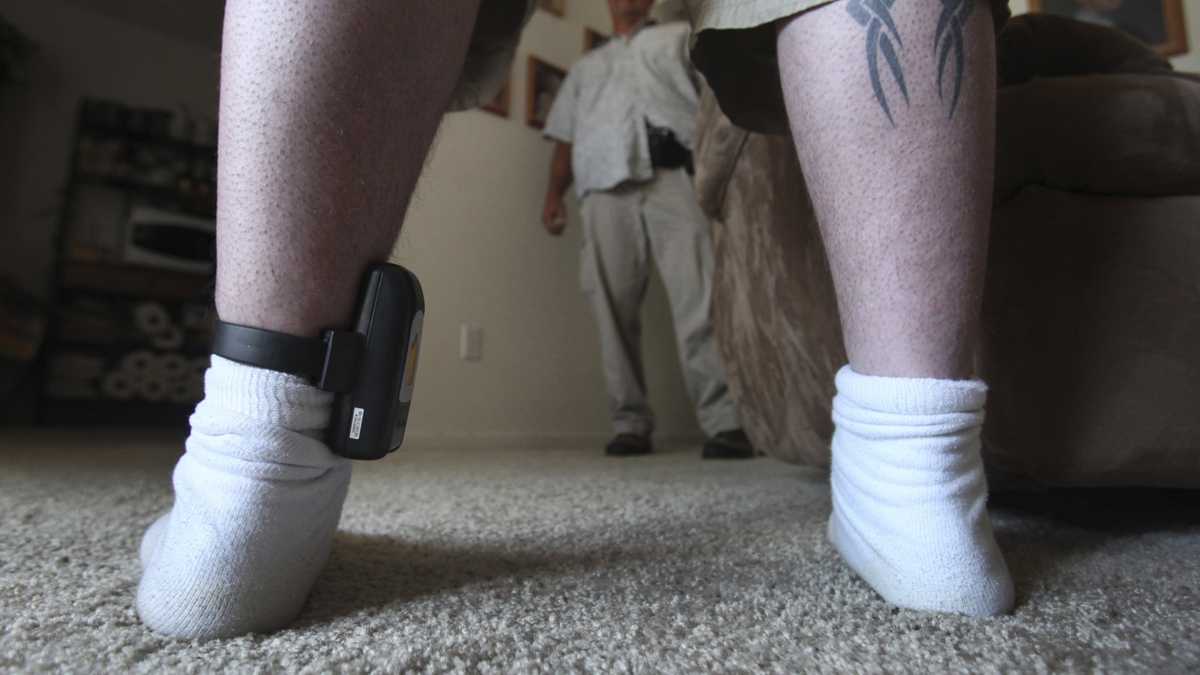Federal appeals court hears challenge to New Jersey bail overhaul
Attorney claims his client has a constitutional right to be offered money bail instead of home detention.

A person wearing an ankle monitor. (Rich Pedroncelli/AP Photo, file)
Attorneys for a New Jersey man charged with aggravated assault argued before a federal appeals court Wednesday that their client should have been able to pay cash bail to secure his release after his arrest last year.
Instead, Sicklerville resident Brittan Holland was confined to his home and subject to GPS monitoring following an April bar fight in which he allegedly sent a man to the hospital.
The case is one of the first major challenges to New Jersey’s overhaul of its bail system, which opponents have called “unconstitutional.” In January 2017, the state virtually eliminated cash bail and switched to a risk-based system to decide whether to hold defendants in jail before trial.
Previously, judges had to set cash bail in most cases. Now they can simply release low-level defendants who previously may have been stuck in jail simply because they couldn’t afford to pay. Judges can also detain defendants who pose a danger to the public.
But in making that decision, judges have to reject all of the non-monetary options — such as home detention, GPS monitoring, and reporting to a court officer — before they can consider imposing cash bail as a condition of release.
Attorneys for Holland say that violates his constitutional rights.
“Put cash bail as part of the mix,” said Paul Clement, one of Holland’s attorneys and a former U.S. solicitor general, during oral arguments at the 3rd U.S. Circuit Court of Appeals in Philadelphia Wednesday. “Don’t take that off the table.”
Clement argued that the state deceptively claims to want to put the least restrictive conditions on defendants released pending trial, but will only allow cash bail to be considered after everything else is ruled out. The option for cash bail is stuck “behind emergency glass,” Clement said. (Cash bail was offered to only 44 defendants in 2017.)
Assistant New Jersey Attorney General Stuart Feinblatt asserted that the prosecutor trying Holland’s case worried about the danger Holland posed — not whether he would show up for a future court date, which is the only reason cash bail can be issued under the state’s new system.
The three-judge panel seemed most skeptical of Clement’s arguments.
“Isn’t that a more equitable system for the vast majority of people accused of crimes?” said Judge Luis Felipe Restrepo, referencing the state’s goal of not imposing cash bail on poor defendants.
At another point, the judges resisted Clement’s claim that Holland had an Eighth Amendment right to be offered money bail. “I don’t see the U.S. Constitution as guaranteeing cash bail,” said Judge Julio M. Fuentes, suggesting instead that the Founders intended only to protect defendants from excessive monetary bail when the option was offered.
In September, New Jersey District Judge Jerome B. Simandle agreed when he denied Holland’s request for an injunction to put a stop to the state’s new system, claiming that doing so would have posed a “high risk” to defendants and the public.
Critics of the state’s bail overhaul, including New Jersey’s foundering bail bonds industry, say the changes have allowed criminals to get back out onto the street within hours of their arrest with little oversight from law enforcement officials.
But backers of the new paradigm point to a 20 percent drop in the state’s pretrial jail population over the last year as a clear sign the new system is functioning as intended.
“Money bail doesn’t work,” said Alexander Shalom, a senior staff attorney at the ACLU-NJ, which filed a friend-of-the-court brief in the case. “New Jersey was within its constitutional limits and indeed was wise to get money out of the picture.”
Shalom said the state’s criminal justice system is achieving its dual purpose: fewer poor people are sitting in jail on bail amounts they can’t afford, while defendants who are deemed a danger to the public — like Holland — face tighter pretrial restrictions that money bail was never meant to address in the first place.
“The reason [Holland] has these conditions, the reason he’s wearing an ankle bracelet is because they were afraid he was gonna hurt somebody,” Shalom said.
WHYY is your source for fact-based, in-depth journalism and information. As a nonprofit organization, we rely on financial support from readers like you. Please give today.



